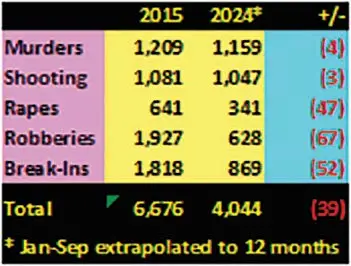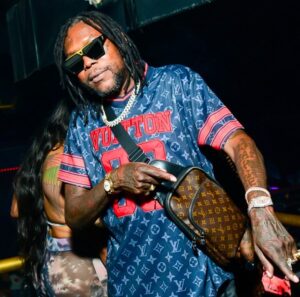
Winning the war on crime
The Jamaica Constabulary Force (JCF) was established in 1867, two years after the Morant Bay Rebellion. The JCF was intended to be a civil body with a military structure and was based on the Royal Irish Constabulary. While in Britain policing was by consent, the main focus of the model adopted in Jamaica was to keep the black masses from threatening the British colonial system.
Not surprisingly, the JCF has had an abominable reputation among the common folk, often being viewed as a brutal occupying force, particularly by Rastafarians who labelled police Beast Men and Babylon. Historically, respect from the law men towards poorer citizens was often non-existent.
However, this has changed dramatically. Over the past 10 years or so the antagonistic relationship between the public and the police has almost vanished. The “big boots”, “big baton stick”, brute force narrative is no more. This transformation was no doubt partly organic — a democratic society forcing change on politicians.
Outside forces, such as the US and UK, may have applied behind-the-scenes arm twisting for the creation of an independent institution to investigate JCF wrongdoing by threatening aid cuts. The Independent Commission of Investigations (Indecom) has certainly helped to reduce excessive brutality and killings by JCF.
Commissioner of Police Dr Kevin Blake, a computer programmer by profession before joining JCF at age 29, gives other insights.
“We still highly respect our former name brand members who made a larger-than-life impact in carrying out their duties. Brave men such as Renato [Adams], ‘Trinity’ [Keith Gardner], ‘Bigga Ford’ [Cornwall Forde], ‘Cowboy Knight’ [Derrick Knight]. However, the JCF has evolved beyond that style of policing for good reasons. The force multiplier effect of having the organisation — rather than single individuals — enjoying the trust and confidence of the people and the perpetrator’s healthy fear — is critical in tackling today’s crime problems.
“The JCF is among a very few police organisations this side of the world to have obtained ISO 9001 certification for quality management. Such certification means that an organisation’s quality management system delivers services at the highest international standards. We are one of only about four police forces in the region to be ISO 9001 certified and have been highlighted as a regional leader that might encourage other police forces worldwide to follow suit.
“For the first time ever the JCF has its full complement of personnel. Over the past 10 years our staff count, which includes sworn and unsworn members, has gone from about 14,000 to over 18,000 — we might have more employees than any other organisation in the English-speaking Caribbean. Our mobility has significantly increased also. We have built 13 new police stations and refurbished 128. Our technology has increased leaps and bounds.
“There is certainly no police force in the English-speaking Caribbean that is more technologically advanced than the JCF. Scaremongers used to claim: ‘Our police are outgunned! Criminals have more advanced guns than them!’ You don’t hear that anymore.
“We have not only been talking transformation, but walking the walk. Last summer’s JCF tech expo at the National Arena was probably one of the most impressive expositions ever witnessed in Jamaica. The intent was to further the conversation about true organisational transformation and to demonstrate to Jamaicans the disconnect between the false narratives that sought to define the JCF’s true story. As utterly impressive as the display of its people, quality, and technology was, we made it clear that nothing seen was aspirational — it was our current lived reality.
“We have increased our focus on public order and road safety. The Beat Officer Patrol Division (BOPD) aims to ensure safe public spaces in town centres and market districts. Since they interact most frequently with regular folks, they are a kind of JCF PR [public relations] arm. So we have been very careful in the training and monitoring of how they deal with John Public and the feedback is generally very positive.”
Leadership has clearly been crucial in the JCF’s transformation. As the chart below shows, not all police commissioners have been cut from the same cloth. The significant decline in murders under Owen Ellington and Antony Anderson must in some way signify superior management. Dr Blake has also started very promisingly. Interestingly, Dr Blake’s father is the brother of Ellington’s mother. Let us hope he can drive down the murder rate as sharply as his cousin did.
Last year I asked community activist Henley Morgan if the relationship between Jamaican citizens and the police is the best it has ever been. He fully agreed. The once-common mass protest cry of “We want justice!” is now seldom heard. For the first time ever, most Jamaicans see the police as partners, not adversaries. It is one of the most dramatic social changes in Jamaican history.
Yet, incredibly, there is almost no national discussion of this, or the sharp drop in murders. The Janus-like approach of the Jamaican media to crime is inexplicable. When murders were going up it was constant front page news, with newspapers running daily headline banner counts. Now that homicides are declining, the media is silent. Murders are down 18 per cent from January 1 to September 30 and on track to be under 1,160 by the end of 2024, which would be the lowest annual homicide count since 2014. Rapes are down over 30 per cent. Major crimes are down 14 per cent. But you rarely see these featured in the newspapers, or on radio, or TV. Why the glaring dichotomy?
Major crimes overall are down 39 per cent. A key component of this success has been dismantling gangs. The commissioner reckons that of every 10 gang members, two are what he calls lead singers, with the rest providing backup harmony. Get the hardcore, irredeemable lead singers out of circulation and the backups are usually amenable to gainful employment.
Some argue that if homicide declines are highlighted, then nefarious forces will launch murderous campaigns to drive it back up. But Dr Blake says this is faulty logic. Despite such quotes in the Klansman trial, criminals lack the capacity to do anything of the sort, and their attempts are not frequent or sustained. We need not deny the public such important information because of fear of this rare phenomenon.
On the contrary, research shows that when murder declines are publicised, the taking of human lives becomes less normalised, and domestic homicides fall. It would not only be good journalism but also in the national interest for the current significant declines in homicides to be highlighted.
Furthermore, he says, it is critical for the country to have a collective national debate about the decline in crime. Why are murders going down? What are we doing that is working well? Is there anything else we can do to accelerate the trend? What precautions should we take to make sure we don’t go back to the bad old days?
The commissioner knows things are not perfect. Jamaica is still some way from the immediate target of achieving the Latin American average of 16 murders per 100,000, and there will always be flare-ups and bad eggs. But he fully expects homicides to continue to fall.
As gang murders decline, so will reprisal killings, creating a virtuous cycle and possibly a snowball effect. In his considered view, the JCF is winning the war on crime. Police are now fully in charge of the country’s public spaces, and the murderous gangsters are very much in retreat. The record numbers of personnel, unprecedented technology, improved infrastructure, and modern management systems mean that, as far as the JCF is concerned, “We run tings, tings nuh run we!”
kob.chang@fontanapharmacy.com


Kevin O’Brien Chang
























